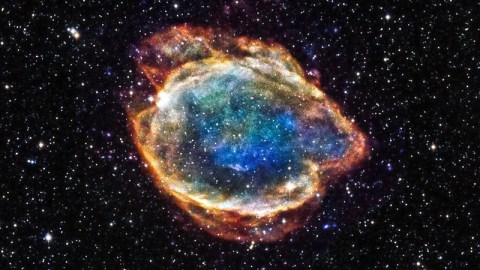New study says cosmic acceleration and dark energy don’t exist

NASA
- Paper by Oxford University physicist Subir Sarkar and his colleagues challenges how conclusions about cosmic acceleration and dark energy were reached.
- Physicists who proved cosmic acceleration shared a Nobel Prize.
- Sarkar used statistical analysis to question key data, but his methodology also has detractors.
Is our Universe’s expansion speeding up? The 2011 Nobel Prize went to three scientists for proving just that. But what if the evidence they used to come up with this conclusion was wrongly interpreted and the supposed cosmic acceleration is simply an artifact of our movement through a local part of the Universe? In the big picture, there’s no speeding up. What’s also not there is the mysterious dark energy, thought to be creating that acceleration, says a new paper from a group of physicists who take issue with the supernovae-related evidence that was used to come up with the original Nobel-worthy conclusion.
The Nobel Prize for the cosmic acceleration idea, if you’re wondering, was won by Saul Perlmutter, Brian Schmidt, and Adam Riess for “for the discovery of the accelerating expansion of the Universe through observations of distant supernovae”. They used evidence from exploded stars called “la supernovae” or “standard candles” to show that the Universe’s expansion was getting faster. These kinds of supernovas are so bright that we actually know their absolute brightness. This fact allows scientists to calculate the distance of these explosions from Earth, while studying the red shift in the light they emit points to the Universe’s rate of expansion. In 1998, groups led by Perlmutter and Schmidt found light from 50 supernova to be dimmer than it was supposed to be, leading them to conclude that cosmic expansion was actually accelerating (thanks to dark energy – a yet-to-be-directly-observed enigmatic force that supposedly takes up 68% of all mass-energy in the Universe while causing it to expand).
But while the expansion has become accepted as science fact, there have been some who see things differently. Following up on his 2015 paper on this subject, Oxford University physicist Subir Sarkar and his colleagues at the Niels Bohr Institute and the Paris Institute of Astrophysics now published a second study taking issue with the idea of a Universe growing with acceleration.
As explained in Physics World, by statistically analyzing a sample of 740 la supernovae in their 2015 paper, Sarkar’s team found “only marginal” support for cosmic acceleration with low statistical significance. The difference in their approach was in how they looked at the procedures used to calculate the absolute brightness of supernovae and how their light is absorbed by dust that gets in the way.
2011 Nobel Laureates in Physics, Saul Perlmutter, Brian P. Schmidt and Adam G. Riess
2011 Nobel Laureates in Physics, Perlmutter, Schmidt and Riess, describe how an assumed error turned into the surprise discovery that the universe is expandi…
Critics of that paper abounded, taking issues with their methodology and pointing to other data that showed acceleration. Now, in the second paper, to be published in Astronomy and Astrophysics, the scientists continue to assail the supernovae evidence and the idea of cosmic acceleration by pointing to anomalies in the red-shift data and how calculations with respect to the Cosmic Microwave Background (CMB) are carried out.
“If you look at supernovae in only a small part of the sky, it would look like you had cosmic acceleration,” Sarkar says. “But we are saying that it is just a local effect, that we are non-Copernican observers. It has nothing to do with the overall dynamics of the universe and therefore nothing to do with dark energy.”
Riess disagrees with Sarkar’s conclusions and data, calling it outdated. His team used data from 1,300 supernovae in their latest study and came up with clear-cut support for the acceleration’s existence. Furthermore, he stated, “The evidence for cosmic acceleration and dark energy are much broader than only the supernovae Ia sample.”
Who would argue with a Nobel Prize-winner? Subir Sarkar, who believes that “The CMB does not directly measure dark energy,” adding “That is a widely propagated myth.”
You can check out his new paper for yourself at arXiv.
Lisa Randall: Dark Energy Will Take Over
Physicist Lisa Randall on why dark energy doesn’t dilute as the universe expands.





